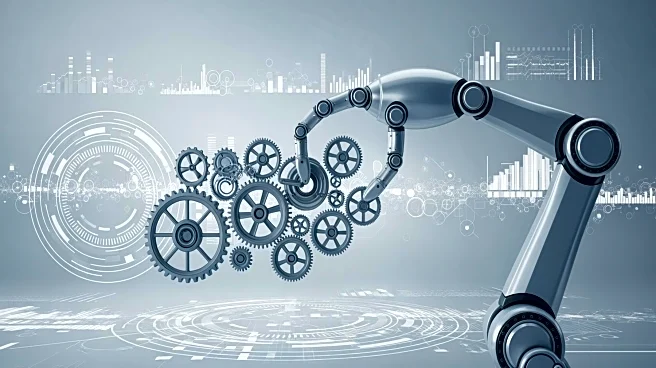What's Happening?
Robotic Process Automation (RPA) is a technology that uses software bots to automate repetitive, high-volume tasks that are rule-based and trigger-driven. These bots mimic human-computer interactions to perform
tasks such as data entry and file management, thereby boosting efficiency in organizations. RPA is designed to automate mundane tasks, allowing workers to focus on more meaningful work and reducing data-entry errors. The technology is particularly beneficial in sectors like finance, customer service, and HR, where it can streamline processes and improve productivity.
Why It's Important?
RPA is crucial for businesses looking to enhance productivity and reduce operational costs. By automating routine tasks, organizations can allocate human resources to more strategic roles, fostering innovation and growth. The technology also minimizes errors, ensuring compliance and improving customer experience. As businesses face increasing pressure to optimize operations, RPA offers a scalable solution that can be tailored to specific needs, making it an attractive option for companies aiming to stay competitive in a rapidly changing market.
What's Next?
The future of RPA involves deeper integration with artificial intelligence, enabling bots to handle more complex tasks and make decisions based on data analysis. As RPA technology advances, businesses will need to evaluate their processes to identify opportunities for automation. The implementation of RPA will require collaboration between IT and business units to ensure seamless integration and maximize benefits. Companies may also explore partnerships with RPA vendors to access cutting-edge solutions and stay ahead in the automation landscape.
Beyond the Headlines
The rise of RPA raises questions about the future of work, as automation takes over tasks traditionally performed by humans. While RPA can lead to job displacement, it also offers opportunities for workforce transformation, where employees can be retrained for higher-value roles. Additionally, the ethical considerations of data privacy and security in automated processes will require careful attention to ensure compliance with regulations. As RPA becomes more widespread, organizations will need to address these challenges to fully leverage the benefits of automation.










